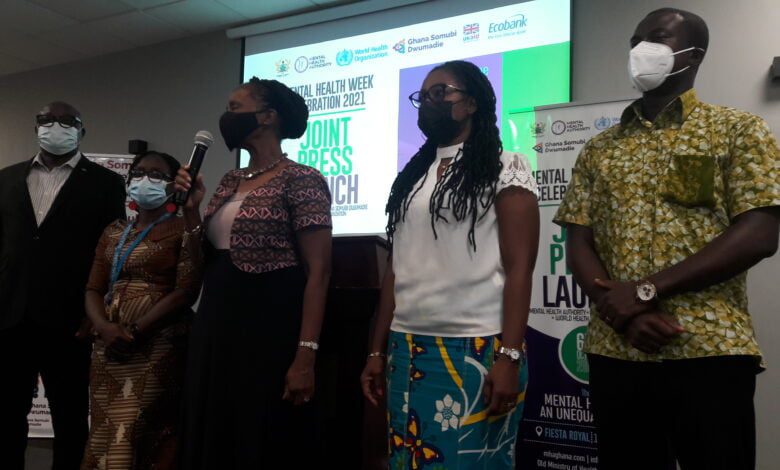
As Ghana marks World Mental Health day, a group of stakeholders in mental health sector are keen to have identify opportunities to increase the flow of funds in a sustainable way to support mental health and therefore called on government to be committed in investing higher or greater in mental health services in the country.
Gaps in mental health service provision have been made worse by the negative impact of COVID-19 on persons with mental health in the country.
In a joint press release by Mental Health Authority (MHA), World Health Organization (WHO) and faciltated by Ghana Somubi Dwumadie which was read on behalf of the group by the Deputy Director of MHA, Dr. Caroline Amissah at the launch of Mental Health Week celebration on the theme “Mental Health in an Unequal World” in Accra, said ” this high level technical working group have overseen and guided to work and develop an investment case for mental health services”.
According to the statement, the group are drawn from key mental constituencies such as government and non-government stakeholders, development partners and academics as well as key areas of expertise.
” this broad and high-level membership revealed 3 key outcomes, which are: investing in mental health supports Ghana’s economic growth, investing in mental health stenghthens poverty reduction efforts and investing in mental health improves population health and reduces the burden on the health system”, the statement noted.
The group therefore called on government and other various sectors aligned with mental health services to invest in the sector in order to support improved access to psychotropic medicines, non-drugs therapies and strengthened governance and accountability measures such as establishment of Mental Health Reviews Tribunal.
“We also calling on for the inclusion of mental health into the National Health Insurance Scheme (NHIS) benefits package and the use of the Untied Nation’s-One Health Tool to accurately cost key mental health interventions and address resource adequacy for mental health service and system scale-up”, it said.
The group further appealed to the Ministry of Local Government (MoLG) to mandate and enforce the existing policy in order for Municipal and District Assemblies (MDAs) to make budgetary allocations (ring-fenced) for mental health services.
It further stated ” we also encourage, under the canopy of corporate social responsibility, mental health”.
Meanwhile, Ghana has a comprehensive Mental Health Law (2012) that has been praise by WHO as an exemplar to other countries for its focus on integrated, community-based approaches and for framing access to care as human right.
But, however, while the legal and policy frameworks exist to improve health services in mental health, implementation remains a challenge.
The group statement indicated that, about 85 to 98 percent, which forms the majority of persons with mental health issues and conditions, either cannot or do not have access to treatment required in Ghana.
Again, it reported that Ghana spends only about 1.4 percent of total government health expenditure on mental health which has made it possible for the burden on mental health to worsen which poses a serious consequence in the economic and social development as well as health and wellbeing of citizens in the country.
The statement said, funds are urgently needed to implement mental health legislation, and scale up implementation of Ghana’s mental health policies, strategies and to enable MHA to fulfill its mandate in order to provide culturally appropriate, humane and integrated mental healthcare throughout the country.
On the issue of cost, the statement noted that, mental health treatment and Services are extremely high. Recent estimate put the global cost of depression and anxiety at 1.15 trillion dollars yearly in lost productivity whiles in Ghana, it is estimated that nearly 7% of GDP is lost due to psychological distress, compared with 4% of GDP lost to malaria.
Therefore, it is a clear evidence that the benefits of investing in mental health far outweigh the cost because the benefits mostly come from gains in productivity when persons with mental health conditions can play an active role in their communities and in the workforce.
In a solidarity message, the Monitoring and Evaluation Advisor for Somubi Dwumadie, Emmanuel Osei-Mensah reaffirmed how the COVID-19 pandemic has worsened the inequality across the facet of human life including Mental Health.
” it has shown us that none of us is fully immune to mental health difficulties which therefore could affect us and anyone within the social network”, he noted.
Also, according to World Federation for Mental Health, 75 to 95 per cent of persons in low and middle income countries are unable to access mental health services.
“Therefore, there is the need to address and reverse these inequalities to prevent the existing gap in accessing mental health services from widening”, Mr. Osei-Mensah noted.
Other organizations like Ghana Health Service (GHS), Ecobank, NGOs also read their solidarity messages to affirm their commitment to support ameliorate the challenges affecting mental health through financing.
Present also at the launch were BasicNeeds-Ghana, an NGO purpose in tackling mental health issues, dignitaries from various institutions and organizations among others.





